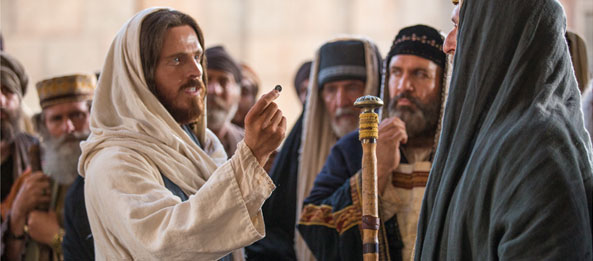Restoring the Gifts to the People
1 Corinthians 12:1-11, 14:26-33
The gifts of the Spirit are not for show. They were never meant for platform performances watched by an idle audience. The church is supposed to be a spiritual army where every soldier is trained in the use of their God given equipment.
John Wimber – the founder of the Vineyard Movement – said “God has given us a vision to see the body of Christ move from being an inactive audience to a Spirit-filled army. This isn’t about a one man show; this is about the equipping of the saints for the work of the Kingdom.” Unfortunately it is the one man show and his inactive audience that we keep seeing. So how do we change?
The Corinthian church is often cited for its weaknesses, but it had some fantastic strengths. And one of them was their desire to move in the gifts of the Spirit. Yes, I know Paul had to instruct them on how to operate the gifts in a more orderly way, but surely a messy church that operates in the gifts is better than an orderly one that does not. Better to have a stable with life than a stable that is clean. So let’s take a look at what we can learn from the gifted Corinthians.
One of the most obvious and exciting things about the Corinthian church was that they were not an idle audience. Operating in the gifts was a congregational thing and not a one man show. It’s interesting that in all the discussion about gifts in 1 Corinthians we don’t hear a word about the pastor. I like that. It doesn’t mean that he didn’t operate in the gifts; it just means that he wasn’t prominent. I imagine that he became one of the congregation when everybody was prophesying and speaking in tongues. Or perhaps he stood back in a corner somewhere so he could oversee everything from a distance.
I think most Charismatic and Pentecostal pastors would agree in theory that their congregations ought to be operating in the gifts, but how many are actively training their congregations? I have walked into a number of churches in different countries and have watched quite a few on TV, and time and again I see the same thing – the pastor operates in the gifts while everyone watches.
Most of the time it is this way because the upfront-show is the only model the pastor has been exposed to, but I think there are also some cases where the pastor actually likes being the show upfront.
Let me nail down what I really want to say here. The gifts have been stolen! They have been taken from the people and are being used to run a show upfront. The gifts are for everyone in the congregation – not just the leaders. And the gifts are meant to be operated in a humble, down-to-earth way – not on a stage under a spot light!
Think of Jesus at the well with the Samaritan woman (John 4:1-42). No one else is around and they are chatting. Jesus says “Go, call your husband.” She says “I have no husband.” Jesus says “You are right when you say you have no husband. The fact is, you have had five husbands, and the man you now have is not your husband.” This is supernatural knowledge. The woman has obviously been dumped by five men. She needs help and Jesus shows her where she can get it. I love the discrete way in which Jesus gives this word of knowledge. He is not walking a platform and psyching up a crowd, he’s helping a woman at a well and only she and he know about it. Sure, the woman later went and told her whole town, but she wouldn’t have if she thought Jesus was just doing it for some kind of crowd pulling show. In fact Jesus was not into religious shows or drawing crowds. Time and again he told those he healed not to tell anyone. He didn’t see any value in multitudes following him wherever he went. At the well Jesus set an example that anyone could follow. Not everybody is a public type of person but everyone can speak to a woman who is drawing water. Jesus was humble and down to earth in his operation of supernatural gifts.
A problem is created when all gifting operates through a microphone at the front of a church. The people watching won’t think they can do it in their seats – they won’t even try. They will think they have to be one of the ‘anointed’ leaders upfront to operate in the gifts. But look at Corinthians; the congregation did it all! As I said, the gifts have been stolen!
Peter was also against showmanship. I love the way Peter plays down the fact that God used him and John to heal a lame man at the temple gate in Acts 3:1-12. A crowd comes running and Peter says “Fellow Israelites, why does this surprise you? Why do you stare at us as if by our own power or godliness we had made this man walk?” Peter was doing his best here to reduce the hype over who he and John were. He was basically saying ‘Look we are ordinary people like you, once you receive the Spirit you can do this too. There’s no show, just relax.’ Don’t you wish TV evangelists were like that?
Hype is a problem. We need to eradicate the hype that is often generated in modern churches around the gifts of the Spirit; there are a number of reasons. The first is that hype and faith don’t mix. Faith is relaxed, it’s not emotionally charged. Some churches have taught their people that they have to get into a kind of ‘faith state’ for God to do something. The people generate this state by repeating something over and over like ‘I believe, I believe – it will happen, it will happen – God is doing it, God is doing it.’ Hey, you don’t have to get psyched up for God to move. Real faith has nothing to do with psych and everything to do with trust.
The first time this really hit me was at a conference on gifts of the Spirit run by the Vineyard Movement in South Africa in 1988. People with needs gathered after the preaching to receive prayer from a large ministry team. As I watched one man caught my eye. He was dressed in jeans and a T shirt and praying for a woman who had a lot of power rippling through her body; she was literally shaking from head to toe. But the man in jeans was relaxed; he just held his hand over her and prayed softly as he looked around the large hall. He did not seem to be focused on the woman at all; in fact it looked like his mind was on other things, perhaps what he would have for lunch. And I thought, ‘Wow, there’s real faith!’ It was obvious that this man knew it was all God’s power and none of his. There was no striving, no psych and no hype. Real faith is relaxed.
Jesus was like this when he calmed the storm. His disciples were in a state, thinking they were going to drown. He was asleep in the boat, so they woke him up. But he was calm and he told the wind and the waves to be calm too. Then he asked the disciples where their faith was. Faith is calm and relaxed, it’s not emotionally charged, and it’s not a state that you have to get into.
When praying for healing, we don’t have to shout and get worked up. Shouting means we believe the miracle requires our energy instead of God’s. And I think we all know that real faith is about trusting God not ourselves. John Wimber said “To create an artificial, emotional charged atmosphere militates against divine healing and undermines training others to pray for the sick.” Why? Because we need to know who God is healing before we can heal. And hype gets in the way of us hearing him.
When leading worship we shouldn’t attempt to stir up the crowd. Our job is to watch for what God is doing and to flow with that. God doesn’t always want a party atmosphere; often he wants tearful repentance or quiet adoration. And we won’t know what he wants unless we learn to dial down and be quiet before him.
So how do ordinary people like the Corinthians learn to hear God? How do they learn to move in the gifts? First let me say this. It is very easy. You don’t have to be super anointed to hear God. In fact many people who claim they have not heard God already have, they just don’t recognize it. Let me give you a hypothetical example.
One day you are in church. You look across the room and notice your friend Anne, and as you look at her you get this sudden sense that she is sad. It’s just a hunch. Her face isn’t showing it, you just feel it. The next thing is you are thinking of her husband for some reason. You quickly shrug it off and concentrate on the sermon. The next thing is the preacher quotes ‘Husbands love your wives’ and your thoughts go back to Anne. After church you are chatting with Anne and you ask how her week has been, and she says “Ah, Richard and I are really struggling.” And you think ‘That’s funny, I kind of thought that during the service.’ God often speaks through what we feel, think or see in our minds eye.
The next time you have a thought like that you could test it out. Go to Anne and say “How are things with you and Richard?” If she says “Really bad” or starts to cry, you know you heard God. If she says “Things are fine, why’d you ask?” you can dismiss it as your own thoughts. With trying this again and again with different people you soon see the difference between your thoughts and God given ones.
Sometimes the divine word will have a number of confirmations like in my example above, and at other times God will just speak once. The message could also come as a picture or a word that flashes in your mind. Some people are more in tune with what they are feeling, thinking and seeing moment to moment and will find it easier to recognize that a certain thought isn’t normal. But with a bit of practice everyone can do it.
Learning to hear God like this is foundational. All gifts operate on the basis of hearing. This is obvious with gifts like prophecy, words of knowledge and interpretation of tongues. But it is also true with healing and miracles. We have to know who God is healing before we can heal anyone.
We may stand in awe of the man of God that parades the platform doing signs and wonders, but there’s no need for that. The Corinthians were ordinary people like you and me, and just like you and me they weren’t particularly holy and weren’t thought of as being highly anointed, but they knew what God was saying and they knew what God wanted them to say to others. They didn’t always do it in a loving way, but that’s a different subject that we can reserve for another message.
Let me close by reminding you of my main point. The gifts were given to the common believer. They have been stolen by showmen. It’s time to restore the gifts to the people.







